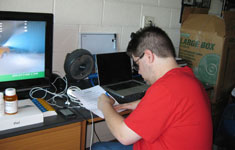Why Go to College?
Postsecondary Education for Young Adults with Disabilities: What Families Can Do
The Next Step is a 19-minute motivational video designed to challenge students, families and educators to consider higher education for individuals with disabilities.
SAT and ACT Accommodations
SAT – Steps to receiving test accommodations for students with disabilities

Typical Sequence for Obtaining Accommodations at College
Colleges and universities that receive any federal aid, and most do, are required to accommodate students with disabilities. Most colleges will have a Disability Services Office whose mission is to serve students with disabilities. Requirements for qualifying for accommodations vary from college to college, so please check with your college for specific guidelines, which may differ from the following.
- Apply for admission to the college and be accepted. We recommend you apply several months to a year before the semester in which you plan to begin college.
- Contact the Disability Services Office to learn more about qualifying for accommodations.
- Qualify for accommodations. You will often be required to submit documentation which helps the office determine if you qualify for accommodations and the type of accommodations you will require. This may be as simple as a letter and medical records from your physician or may require providing the results of extensive testing. The disability services office may guide you as to what is needed, but will often leave it pretty open-ended, allowing you to determine what to submit. We recommend that you apply for accommodations months in advance so that you will have adequate time to gather documentation. If the committee that determines qualificiation meets often, you may prefer to submit a doctor’s letter and brief medical records to see if this minimal amount of information will qualify you for accommodations. Then, the committee can request additional documentation if required. If the committee does not meet often, you may want to submit additional documentation. You will want to avoid last minute attempts for accommodations – don’t wait until the month or week before classes begin!
- Ask your doctor to include a list of accommodations in his letter to the university. It will probably be helpful for you to provide your doctor with this list.
- Once you’ve been accepted for accommodations, meet with the Disability Services Office to discuss your accommodations. Ask them if there are additional accommodations that they offer that you may not have thought about.
Types of Accommodations
- Priority Registration so you can plan your schedule to minimize walking distances. If you take medication that makes you drowsy, you may also want to plan classes at a certain time of day. Priority (early) registration will give you more of a chance of getting into a class before it is closed.
- Note takers
- Permission to record all lectures
- If available, professors provide class notes, power point presentations, and any other resources they use in classroom
- Extended time to take exams and quizzes
- Use of a computer for essay and short answer questions
- Reduced distraction test location
- Physically accessible classroom
- Permission to be tardy to class
- Physically accessible residence hall room
- Parking near classrooms
- Special permission to park in Staff and Faculty parking lots
- If health issues, permission to miss a certain number of classes
Providing College Instructors with Information About Your Disability Needs
Most disability service offices will generate a letter for you to take to your professor describing your accommodations and both of your rights and responsibilities. You will probably be required to deliver this letter to your instructor. We recommend that you deliver these letters immediately. While you may choose to hand them directly to the instructor at the first class, this is sometimes a rather busy time for the instructor and he or she may not give full attention to the letter contents. It is suggested that you set up an appointment to meet with your instructor prior to the first class. If the instructor is not available prior to the first class, give the letter to the instructor at the first class, then make an appointment to meet with the instructor as soon as possible. This is especially important if you need assistance from the instructor in locating a notetaker in your class.
Tips from Students
- Let your instructor know about your needs as soon as possible
- Remember that your instructor probably has hundreds of students and it’s usually up to you to remind your instructor of your needs
- If you take your exams in the Disability Services Office or location or time other than in your usual classroom, you may need to remind your instructor to take your exam to that special testing location. Do not wait until the night before the exam to notify them. Notify them according to your college’s instructions and if there are no instructions, notify them at least four days in advance, then remind them two days in advance. It may be best to notify the instructor by email.
- A day or two before the exam, contact your testing location to see if the instructor has dropped off the exam. If they have not, send another email reminder to the instructor.
- If you are taking the exam earlier than your peers, DO NOT discuss the exam with your peers. Discussing exams after you have taken them and before your peers have taken them is usually a violation of university policy.
Paying for College
There are a variety of methods for an individual with a disability to pay for college – pay privately, scholarships, grants, and special programs. Your state’s Department of Rehabilitation Services may help pay for college if you pass their requirements which usually consist of proving that in the future you will be capable of gainful employment, choose a career that requires a college degree, and if you meet the financial guidelines. The financial guidelines vary from state to state. Often, if you are receiving benefits from SSI, then the Rehab Department will automatically only consider your income and assets when determining how much they will pay for your education. If you do not receive SSI, they may also consider the income of your parents. There are many steps involved before the Rehabilitation Department will pay for your college education and some of these involve:
- Qualifying for services with the department of rehabilitation
- The department of rehabilitation will determine if you are physically and cognitively able to succeed in the career you’ve chosen. Their determination may involve a series of tests such as neuropsychological testing, IQ and achievement testing, physical ability testing, and other assessments, depending on your chosen career.
- You may be asked to apply for scholarships and government funding and provide the Dept. of Rehab with proof that these have been denied.
- Scholarships and other benefits you receive will offset the amount the Department of Rehabilitation will pay. So, if you receive a $1000 scholarship from the college, the Department of Rehab will reduce the amount it will pay by $1000.
- Once they have determined that you qualify for payment, they will usually set up a plan that includes semester or 9 month review of your grades and courses to make sure you’re on a successful path. Remember – the purpose is to end up with a job – not to just fulfill a dream of a college degree.
- You will often be asked to provide a copy of your college degree plan.
- The Dept. of Rehab will usually only pay for courses that are listed on your degree plan.
- Sometimes the Dept. of Rehab will pay for your books and other supplies. They may not pay for books that are optional.
- If your local college does not offer the degree you’re seeking and you need to live in a dorm, sometimes the Dept. of Rehab. will pay for your dorm and meal plan. This may depend on how far from home the college is located. They may instead expect you to commute if the drive is not too far.
Choosing a Dorm

- Look for a dorm that is near the center of campus or has a campus shuttle bus stop nearby
- Choose a dorm that is well lit and requires a key pass to enter outside doors
- If the dorm does not have elevators, a room on the first floor may be safer in case of fire
- A dorm room near the laundry room may save time and walking. Or, consider getting a rolling suitcase and use that to take clothes to the laundry room.
- If you’re bothered by loud noises or are easily distracted, consider asking the housing department to place you in a room that’s located away from the common gathering areas of the dorm. You might also consider choosing a private or semi-private room, making it easier to focus without the distractions of a roommate.
- Choose a dorm that’s near a cafeteria if you’ll have a campus meal plan.
Take Care of Yourself
- If you have special medical needs, check in with the campus medical center. You may also want to locate a family practice or internal medicine doctor and other specialists as needed in your college’s city. Your doctors at home can provide information to these doctors in case you need them in an emergency. Make sure all doctors know if anyone prescribes or makes a new medication change.
- Don’t forget to eat. Adults with hemiplegia tire easily and making sure your body gets enough fuel to keep going is important.
- Take advantage of the campus fitness center. You’re probably paying a fee for it, so you might as well use it! Some centers have a personal trainer or you can ask your therapists for exercises that will strengthen and help you keep muscles stretched and in good condition.
- Invest in good walking shoes. Most college students spend a lot of time walking between buildings.
- Get a disability parking permit for your car.
- If you’re out at night, walk home with a friend or call campus security and ask for an escort to your dorm or car.
Other Resources

Typical Campus Policies and Procedures – How specific campuses address the needs of students with disabilities.
7 College Survival Tips for Students with Disabilities
Career Preparation While You’re at College – Learn more about internships, work study, and other opportunities to gain work experience before you graduate
TRIO – The Federal TRIO Programs (TRIO) are Federal outreach and student services programs designed to identify and provide services for individuals from disadvantaged backgrounds. TRIO includes eight programs targeted to serve and assist low-income individuals, first-generation college students, and individuals with disabilities to progress through the academic pipeline from middle school to postbaccalaureate programs. TRIO also includes a training program for directors and staff of TRIO projects. Look for TRIO at your college.
College Students and Disability Law – This article is a little dated (2000), but continues to provide historical and some current information that may be useful to people with disabilities who are pursuing a college education.
University of Washington DO-IT: Disabilities, Opportunities, Inter-networking, and Technology
College Scholarships and Financial Aid
Information for College Educators and Administrators
Access College – Tailored resources for faculty, administrators, staff, and students to help create accessible environments, programs, and resources for students with disabilities in college.








